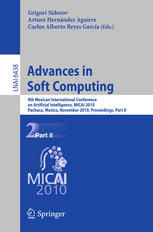Volume 6438 of the series Lecture Notes in Computer Science pp 418-427
The Fuzzy Syllogistic System
- Bora İ KumovaAffiliated withDepartment of Computer Engineering, İzmir Institute of Technology
- , Hüseyin ÇakirAffiliated withDepartment of Computer Engineering, İzmir Institute of Technology
Abstract
A categorical syllogism is a rule of inference, consisting of two premisses and one conclusion. Every premiss and conclusion consists of dual relationships between the objects M, P, S. Logicians usually use only true syllogisms for deductive reasoning. After predicate logic had superseded syllogisms in the 19th century, interest on the syllogistic system vanished. We have analysed the syllogistic system, which consists of 256 syllogistic moods in total, algorithmically. We have discovered that the symmetric structure of syllogistic figure formation is inherited to the moods and their truth values, making the syllogistic system an inherently symmetric reasoning mechanism, consisting of 25 true, 100 unlikely, 6 uncertain, 100 likely and 25 false moods. In this contribution, we discuss the most significant statistical properties of the syllogistic system and define on top of that the fuzzy syllogistic system. The fuzzy syllogistic system allows for syllogistic approximate reasoning inductively learned M, P, S relationships.
Keywords
Syllogistic reasoning fallacies automated reasoning approximate reasoning human-machine interactionReference tools
Other actions
- Title
- The Fuzzy Syllogistic System
- Book Title
- Advances in Soft Computing
- Book Subtitle
- 9th Mexican International Conference on Artificial Intelligence, MICAI 2010, Pachuca, Mexico, November 8-13, 2010, Proceedings, Part II
- Pages
- pp 418-427
- Copyright
- 2010
- DOI
- 10.1007/978-3-642-16773-7_36
- Print ISBN
- 978-3-642-16772-0
- Online ISBN
- 978-3-642-16773-7
- Series Title
- Lecture Notes in Computer Science
- Series Volume
- 6438
- Series ISSN
- 0302-9743
- Publisher
- Springer Berlin Heidelberg
- Copyright Holder
- Springer-Verlag Berlin Heidelberg
- Additional Links
- Topics
- Keywords
-
- Syllogistic reasoning
- fallacies
- automated reasoning
- approximate reasoning
- human-machine interaction
- Industry Sectors
- eBook Packages
- Editors
-
- Grigori Sidorov (19)
- Arturo Hernández Aguirre (20)
- Carlos Alberto Reyes García (21)
- Editor Affiliations
-
- 19. Centro de Investigación en Computación, Instituto Politécnico Nacional
- 20. Centro de Investigación en Matemáticas (CIMAT), Area de Computación
- 21. Ciencias Computacionales, Instituto Nacional de Astrofísica, Optica y Electrónica (INAOE)
- Authors
-
- Bora İ Kumova (22)
- Hüseyin Çakir (22)
- Author Affiliations
-
- 22. Department of Computer Engineering, İzmir Institute of Technology, 35430, İzmir, Turkey
Continue reading...
To view the rest of this content please follow the download PDF link above.




